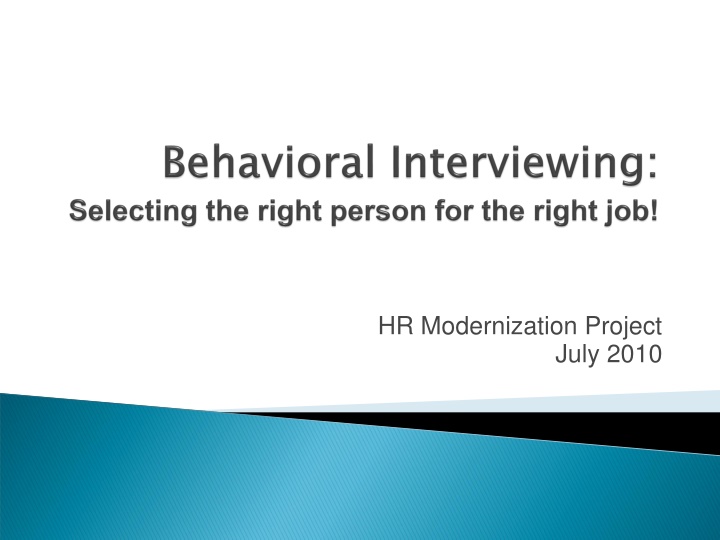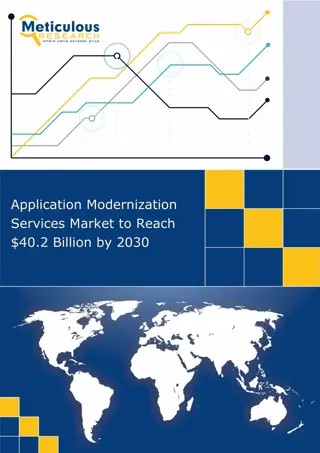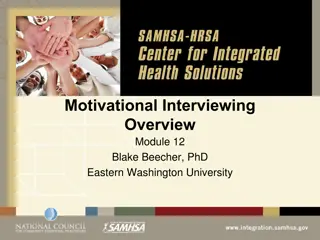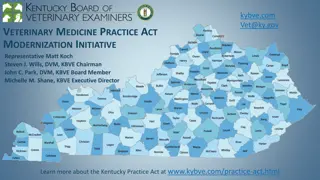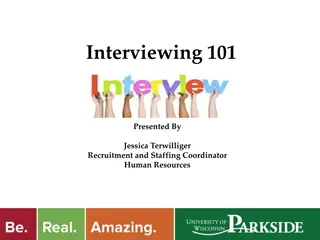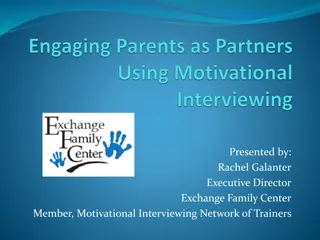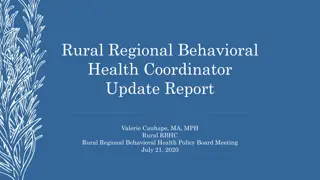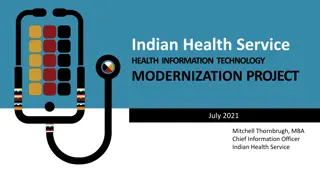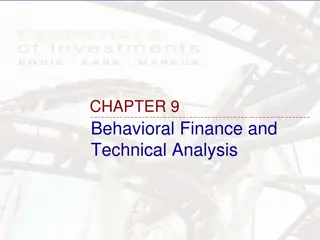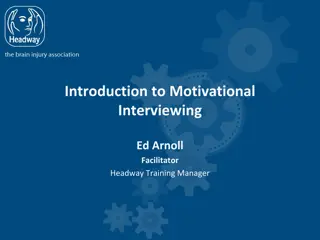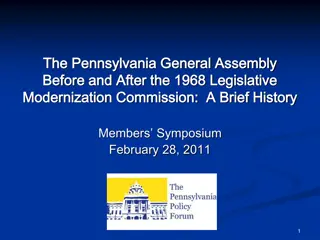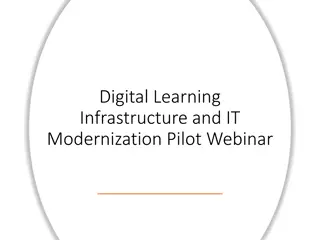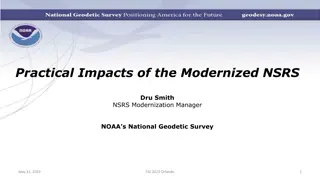HR Modernization Project - Behavioral Interviewing Overview
In the HR Modernization Project, behavioral interviewing is emphasized to assess candidates effectively. This method involves asking specific questions about past experiences to predict future behaviors. The session aims to help learners define, prepare, and conduct behavioral interviews, as well as develop evaluation tools. Benefits for organizations and candidates are outlined, along with guidelines for creating behavioral interview questions. Additionally, the importance of strategic thinking in identifying job-related skills and behaviors is highlighted.
Download Presentation

Please find below an Image/Link to download the presentation.
The content on the website is provided AS IS for your information and personal use only. It may not be sold, licensed, or shared on other websites without obtaining consent from the author.If you encounter any issues during the download, it is possible that the publisher has removed the file from their server.
You are allowed to download the files provided on this website for personal or commercial use, subject to the condition that they are used lawfully. All files are the property of their respective owners.
The content on the website is provided AS IS for your information and personal use only. It may not be sold, licensed, or shared on other websites without obtaining consent from the author.
E N D
Presentation Transcript
HR Modernization Project July 2010
By the end of this session, the successful learner will be able to: Define behavioral interviewing Explain the benefits of behavioral interviewing for organizations and candidates Identify the steps in preparing and conducting behavioral interviews and behavioral reference checks Identify and write behavioral interview questions Develop tools to evaluate candidates
Interviews in which questions are designed for the candidate to give specific information on how he/she has handled or reacted to situations in the past that are likely to come up in the job for which you are recruiting. Based on the premise that past behavior is the best predictor of future behavior
Are objective Relate specifically to knowledge, skills, abilities, or work qualities needed to be effective in the position being filled Require the interviewee to provide examples of their experience and background in a specific area
Describe a situation where you had to defend or explain an idea or proposal. Who was the audience, what were the issues, and what was the outcome? Describe a situation where you had to complete work with little or no direction from supervisors or colleagues?
For employers Hire the best person for the job More productive more quickly Less initial training and development Greater chance of retention Individual performance is linked to organizational performance For candidates Better application of one s skills to job Matching people to jobs leads to increased satisfaction, self- esteem, self confidence Can immediately see their direct contribution to organizational goals Sees organization as a place to build a career
Think strategically Identify the knowledge, skills, abilities, and on- the-job behaviors (KSABs) and training needed for successful performance Review and, if needed, update the job description Make a list of behavioral questions Develop a rating scale to evaluate candidates 1. 2. 3. 4. 5.
See your HR Office as your strategic partner What are your organization s workforce and strategic plans? How does your division, unit, etc. contribute to organizational goals and objectives? How does the specific job you will be recruiting and interviewing for contribute to organizational goals and objectives?
Must be detailed as to what you are looking for in YOUR position now and in the future Consider personal/interpersonal as well as technical skills Don t forget the organizational environment Goal: Good job-person match
Make sure it reflects the KSABs needed for successful job performance Clear, up-to-date job descriptions helps candidates decide if they want to apply for the job and tells them exactly what you expect of the person you will select.
Zero in on the KSABs that are needed to perform successfully in the job Focus on what the person has done in the past, NOT what they think they might do in the future. Always remember what is important to the job and the organization.
If you are looking for accountability: Tell me about a time that you had too much work to complete by the deadline. Give me an example of a time when you were unable to meet your goals. What did you do? If you are looking for the ability to resolve conflict: Describe how you successfully handled a situation with a particularly difficult customer or coworker.
If you are looking for the ability to analyze: Tell me about a recent work problem you encountered. How did you analyze the situation and come to a decision? Can you provide an example of when you had to make an important decision about your work when little data was available.
Describe a time. Tell us more about . What is an example of when When have you What were What (how, where, why, when) did you .
Describe a time when a project you worked on received organizational recognition. Tell us about a time when you made a mistake, what were the consequence, and what you learned from the incident.
General non-behavioral questions What are your strengths? weaknesses? Why should we hire you? Theoretical or situation questions How would you handle an irate customer? Leading questions We need people who are team players. Are you a team player?
Questions that could be considered illegal Irrelevant questions If you were a tree, what kind of tree would you be?
Supervisors Virtual Help Desk Search the internet List of books, articles, videos HR Mod Resource Tool Page
What is your ideal job? In this position, you would be part of a virtual team. How would you develop relationships with your colleagues in such a setting? Tell us about a time when you had multiple priorities and how you prioritized them. What is your experience in writing research papers? Describe a situation when a leader should not involve staff in a decision. What are your three most important work values? Why? 1. 2. 3. 4. 5. 6. (See Note Page for Answers)
For each of the following, write a behavioral question: 1. Ability to write 2. Ability to communicate 3. Integrity (See Note Page for Sample Answers)
Rating a comparison of a candidates education, experience, awards, and performance against a set of job-related evaluation criteria to assess his/her ability to successfully perform in the position being filled Set in advance Check with your HR Office for any departmental policies or guidance on rating job applicants
Make sure it focuses on what is critical to YOUR job Keep it simple Some people give a weight to critical job elements or use numerical scores Leave room for notes document your selection A rating scale is effective if interviewers are consistent in how they rate candidates.
Knowledge, Skill, Ability or Behaviors Questions: Notes: Some experience and background Little or no experience or background Good experience and background Recommendation:
Sample #2: Rating Scale Sample #2: Rating Scale This rating sheet is developed based on the knowledge, skills, abilities, behaviors identified as important to the job. Rating Profile Rating Scale 5: Excellent experience or background that fits the job 4: Good experience or background that fits most of the job 3: Some experience or background but training will be needed 2 Experience and background is very limited 1: Experience or background is not apparent Leading 5 4 3 2 1 Managing Change Integrity 5 4 3 2 1 5 4 3 2 1 Subtotal: Notes:
Sample #3: Rating Scale Sample #3: Rating Scale Knowledge, Skill, Ability or Behaviors Questions: Notes 1 2 3 4 5 No experience Recommendation: Some experience Good Very good Excellent
Opening Body Closing
Create a positive tone; make the person feel comfortable Introduce the interviewers State the objectives of the interview Establish the timeframe so the candidate can judge how in depth to go when responding to questions
Tell candidates you will be taking notes Tell the person about the job and duties Tips: Tell candidates in advance you are conducting a behavioral interview and want them to provide specific examples of accomplishments and results Consider giving them the questions in advance
Ask questions Use the 25/75 rule (interviewer talks 25% of time; candidate talks 75% of time) Start with open-ended questions that encourage candidates to talk (your prepared behavioral questions) Use closed questions to confirm a point
Use follow up questions to delve deeper into an area or to clarify a point Tell us more about . Can you give us another example of Can you give more specifics Can you elaborate on exactly what your role was in .
End on a clear and positive note by: Summarizing key information you heard Asking candidates if they have questions or additional information they want to share Providing clear follow-up information Staying neutral: don t discourage or create false expectations.
Make notes: Focus on specifics Use quotes when possible Make sure notes are objective and job related
Rate candidate against the selection criteria Use the scale you have developed Rate separately and then discuss and come to consensus on the rating Evaluate your own performance: How did you do?
Review Official Personnel Files Conduct behavioral reference checks
Ask for specifics by using behavioral questions Ask about examples the candidate gave during the interview Stumped as to what to ask Check out the Reference Question Bank on the Virtual Help Desk Capture the information you obtain using the Reference Check Form on the Virtual Help Desk
Writing This job requires writing and editing papers with minimal supervision. Does Mary perform this type of work in her current position? If so, what is your assessment of her writing and editing skills? What types of documents has she written and edited? Change Leadership Did Jordan deal with any major change or upheaval while he was with your organization? What was the change and how did he deal with it?
Support your selection or non-selection Check with your HR Office as to what is required, or Don t forget to notify all candidates about the results
Thank you for taking this training! Send feedback or questions to HRModFeedback@dpa.ca.gov For more information, visit the HR Modernization website.
